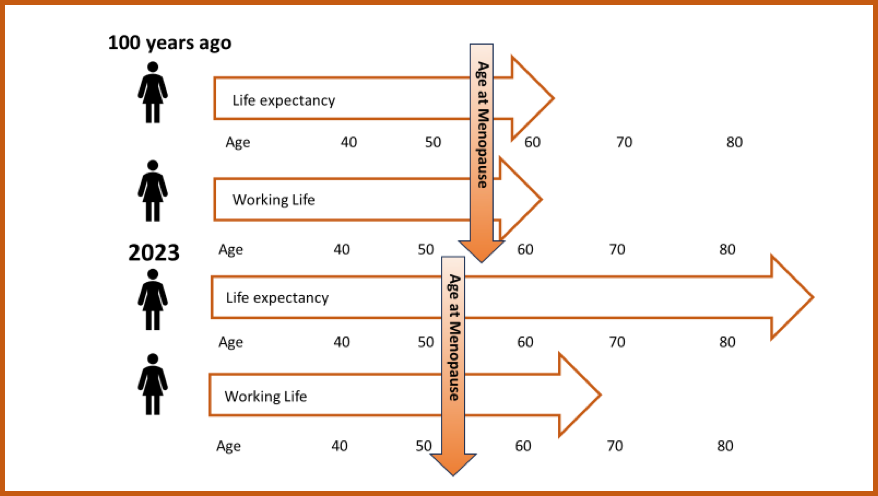
Welcome to our Phoenix for Employers Blog by Phoenix Wellness Coaching. I am a regular blogger and have a YouTube channel that supports women experiencing menopause, but I recognise we need a different approach to help employers, and to this end, I launched my employers’ blog. In this monthly blog I will provide you with some practical ways in which you can build a supportive culture of care that enables staff to discuss menopause, empowering them to seek the support they need so that your organisation can retain the skills, knowledge and expertise of these women for longer.
Alongside these blogs I have launched a bi-monthly Phoenix for Employers Forum which is an online discussion open to HR Directors, CEO’s and other senior leaders who want to talk about their challenges in developing a menopause-fit organisation.
Why are we talking about menopause at work?
We all know that menopause is a normal stage of life that all women will experience, whether that is naturally or due to surgical or medical reasons. We also need to recognise that people of diverse gender expressions and identities will also experience menopause, so it is more important to have an inclusive conversation.
In the UK the average at which a person experiences menopause is 51 years, but this masks the fact that for some people they may experience this stage much earlier or much later.
Talking about and supporting staff through menopause has become more important as advances in medical knowledge has resulted in longer life expectancy and increased working life expectancy. The average life expectancy has increased to 83 years, with 1 in 7 of us living to 100 years. In the past, menopause occurred almost at the end of a person’s life and certainly very close to the end of their working life, whereas today menopause is occurring earlier. With 80% of menopausal people in the workplace, the removal of the mandatory retirement age and for financial reasons more people anticipate working into their 60s or 70s we can expect menopause may affect the way in which we work.

What’s the business case for supporting menopause at work?
There is a very compelling case for supporting people through menopause and keeping them in the workforce, quite simply:
- One in ten women leave the workplace due to menopause, resulting in a significant loss of talent.
- Many women will consider retirement (13%) or part-time working (14%) due to menopause-related challenges, impacting the workforce.
- Keeping women in the workplace leads to greater financial independence and stability in later years, benefiting both the economy and society.
- Failure to support employees during menopause can lead to grievances, performance issues, and reputational damage.
- Factors such as lost productivity, recruitment costs, and retention of experienced staff should be evaluated.
What are the major challenges or barriers to retaining staff through menopause?

The challenges can be varied depending on the industry, sector, or size of company, however, at the Phoenix for Employers Forum there was universal agreement around the challenges:
- Getting menopause onto the workplace agenda and securing senior buy-in.
- Supporting staff who may not know they are in perimenopause.
- Understanding whether menopause is an underlying cause of attrition.
- Having the right policies in place to support menopausal staff, and
- How to put in place the right workplace adjustments, especially in smaller organisations.
The solutions to these issues can be both simple and cost effective.
To do just to the topics and solutions we brainstormed, I will break these down into separate Employers Blogs so that you can focus on the areas that will make the most positive impact in your workplace. This month we will look at how to get senior leader buy-in.
Getting senior leader buy-in
We know that without senior leader buy-in no culture change, and that is what talking about and supporting menopause at work requires, will happen or stick. In some organisations that are either male dominated or are smaller family run organisations, it can be a challenge getting the leaders to understand the importance of supporting staff through menopause. Of course, the business case is very clear as too is the legal case, but how else can you get senior leader buy-in?
- Framing the discussion in terms of financial impact – this is squarely within the business case. When staff turnover increases companies can lose expertise, knowledge, skills, and corporate knowledge that has been built up over several years. To fill any role, it is estimated to cost circa. £30,000 and can take many months to get the new person up to the same level.
- Being mindful of the reputational impacts – employees talk to their networks which can be damaging when they don’t feel supported. This will have an impact on your organisation’s ability to retain your current staff, and you may find it even more difficult to attract the staff with the skills you need. Again squarely within the business case, but this will have a knock on impact on “bottom line” performance as people want to work for companies that care about their staff.
- Training for senior leaders and managers on how to approach and support employees experiencing menopause – this is essential. We cn cannot expect our leaders to understand or talk confidently about menopause without the right training. Through training and awareness raising workshops you can create a shared understanding and language around menopause.
- Appealing to a leader’s compassion – leaders are people too and not without compassion and empathy for their colleagues. By having an open conversation around the impacts of menopause and how your staff feel during this time at work, you can appeal to the compassionate side of your leader. Many leaders, both male and female, will find themselves living with or knowing someone experiencing menopause who they would want to support.
- Applying a little pressure – this can mean finding support and buy-in in other parts of the organisation. If staff in other areas and levels of the organisation start to talk about menopause, they can assert upward pressure for change. Think about a menopause network or other staff forums that can not only discuss what needs to change but be instrumental in bringing solutions to the senior leader’s attention.
For more help
If this discussion resonates with you and you want to make a head start on becoming a more menopause-fit organisation, then we can help with awareness raising workshops, manager training, employee consultation and risk assessing your policies and processes. We are also developing a Menopause Fit Audit that will help you to assess where your organisation is now, versus where you want it to be so that you can start actioning planning with our help to plug those gaps – watch out for more information on this in future blogs and newsletters. Reach out to learn more or check out the Employers section of our website at www.phoenixwellness.co.uk

